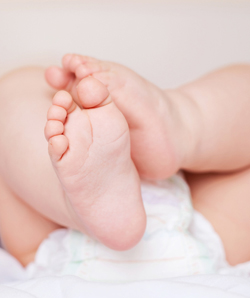Diarrhea in young children – A role for probiotics?

Many parents, especially first time parents, question at one point or another whether their infant’s stool is normal. If there is a sudden and noticeable change in stool frequency and consistency, such as a sudden increase in water content of the stool, it is most likely he/she is experiencing bouts of diarrhea. In every case, you need to consult the child’s doctor whether this is diarrhea. Although evidence is limited, research suggests that the use of probiotics may help prevent and treat gastrointestinal troubles in young children.
What Are Probiotics?
Probiotics are live microorganisms that people can ingest to build the population of “good” bacteria in the gut, which can improve an individual’s overall health. Because most probiotics occur naturally in the human gut, probiotics are generally very well tolerated and safe. Therefore, supplementing with probiotics has been suggested to provide an infant’s gut with a healthy bacterial balance, which may help prevent a number of pediatric conditions, such as colic, eczema and diarrhea.
Which Probiotics Are Friendly?
Not all probiotics are equal! Different species of probiotics, even different strains of the same species, may have different effects and only certain types of diarrhea may respond to probiotics. The most promising bacteria for therapeutic use are Lactobacillus reuteri, Lactobacillus acidophilus, Lactobacillus rhamnosis GG, and Bifidobacterium bifidum.
A recent study revealed that children (aged 6 months to 3 years) at a daycare centre given a daily dose of probiotics, specifically Lactobacillus reuteri, for three months were less likely to develop gastrointestinal issues and had markedly fewer bouts of diarrhea compared to their classmates not supplemented with probiotics. The authors concluded that since children in daycare centers are at increased risk for gastrointestinal problems and experience more bouts of diarrhea, regular intake of probiotics add ‘friendly’ bacteria to the gut and therefore, can reduce the risk of all kinds of conditions that can happen in the gut (Gutierrez-Castrellon et. al., 2013).
In contrast, a study that examined the long-term consumption of probiotics in milk containing Lactobacillus GG in children aged 1 to 6 at a daycare centre did not show a decrease in the number of days with diarrheal symptoms, nor in the proportion of children without diarrhea during the 7-month study period when compared to children not given the probiotic-fortified milk (Szajewska et al., 2011).
The Bottom Line
While there are encouraging signs, research in this area is limited and sometimes conflicting possibly because particular strains ‘friendly’ bacteria may have anti-diarrheal mechanisms whereas some may not. Therefore, the use of probiotics to treat any pediatric conditions should be discussed with your health care provider.




